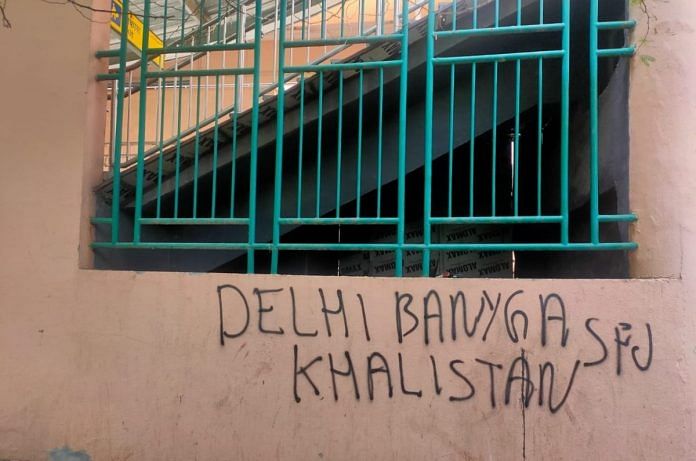New Delhi: Sikh extremists allegedly defaced the outer walls of at least five metro stations in Delhi Sunday. Sikhs for Justice (SFJ), the US-based secessionist group banned in India, has claimed responsibility for the ‘pro-Khalistan’ slogans which mention ‘SFJ’ by name.
“Modi India has committed genocide of Sikhs”, “Delhi banega Khalistan (Delhi will become Khalistan)” and “Khalistan referendum zindabad (long live the Khalistan referendum”, were some of the slogans found painted on the outer walls of the metro stations.
Sikhs for Justice also released raw footage from the various metro stations in question, news agency ANI quoted Delhi police as saying. “SFJ activists were present in multiple metro stations in Delhi from Shivaji Park to Punjabi Bagh with pro-Khalistan slogans.”
A First Information Report (FIR) has been lodged and arrests are yet to be made, sources in the Delhi Police told ThePrint. “Legal action is being taken,” said a senior police officer.
DCP (Metro Delhi Police) Ram Gopal Naik, meanwhile, told ANI that a case had been lodged under IPC sections 153A (promoting enmity among communities), 505 (publishing or circulating anything with with intent to incite offence against the State) and relevant sections of the Delhi Prevention of Defacement of Property Act, 2007, in this regard.
#WATCH | Pro-Khalistan slogans written on the wall of Maharaja Surajmal Stadium Metro Station are being removed by the Delhi Police https://t.co/2mcKBfqJw3 pic.twitter.com/ss7UnKJM5o
— ANI (@ANI) August 27, 2023
These developments come days ahead of the G20 Summit slated to be held in Delhi from 8-10 September. India, which currently holds the presidency of the G20, will play host to over 30 heads of state, other dignitaries and representatives of international organisations.
Over the past few years, there has been a spate of pro-Khalistan demonstrations organised by sections of the diaspora, especially in countries with a sizable Sikh population.
Prior to Prime Minister Modi’s visit to Sydney in May this year, a Hindu temple there was vandalised, purportedly with “anti-India” slogans.
Later, in June, visuals surfaced of a car rally organised in Canada during which participants were seen displaying posters referring to Talwinder Singh Parmar as a “shaheed (martyr)”. Parmar was allegedly the mastermind behind the Air India Flight 182 bombing in 1985, also known as the Kanishka Bombing, which was the worst aviation attack in history until 9/11.
Just last month, two Indian diplomats in Canada were targeted in a poster purportedly circulated by Sikh extremists, accusing them of playing a role in the June killing of Khalistan Tiger Force chief and designated terrorist Hardeep Singh Nijjar. Later, SFJ chief Gurpatwant Singh Pannu issued a video statement, threatening Indian diplomats while standing outside the UN headquarters in New York.
“I don’t think taking a video in front of the UN building lends it any greater legitimacy. We have been consistently and regularly taking up cases of threats etc. with the Canadian authorities and others,” Ministry of External Affairs (MEA) spokesperson Arindam Bagchi had said at the time in response to questions about Pannu’s remarks.
Also read: ‘Air India ki flight mat lo’ — how Canadian neglect led up to Kanishka bombing 38 yrs ago
Sikhs for Justice & ‘Khalistan referendum’
Founded in 2007 by Pannu — a law graduate who is also the public face of the group — Sikhs for Justice claims that its objective is to “liberate Punjab from Indian occupation”.
The group was banned by the Indian government in July 2019 under the Unlawful Activities (Prevention) Act. The Home Ministry had then notified 13 individuals as terrorists. It added nine more to the list last year including Pannu. Nearly a dozen cases have been filed against the SFJ and Pannun in India, including at least three sedition cases in Punjab.
However, in October last year, the Interpol rejected a request by India to issue a Red Notice against him.
At the same time, the SFJ has been organising an unofficial referendum in parts of the world, commonly called the ‘Khalistan Referendum’, seeking support for an independent state for Sikhs. These referendums have elicited sharp reactions from India.
While the first such referendum, which they organised in 2020, fizzled out, they have continued to do so on a smaller scale. The most recent of these was organised in July this year in Canada’s Greater Toronto Area.
Last month, the SFJ allegedly plastered the walls of the sub-divisional magistrate’s office in Haryana’s Dabwali Mandi with threats to the Prime Minister, Union Home Minister Amit Shah and External Affairs Minister S. Jaishankar. “Haryana will become Khalistan too, a warning to PM Modi, Amit Shah, and Jaishankar,” it read. The B.R. Ambedkar College in Sirsa was also defaced with the same slogan around the same time.
In May last year, after ‘Khalistan’ flags were found tied toe main gate and outer walls of the Himachal Pradesh assembly, the state police had booked Pannun and called him the ‘main accused’ in the case.
This is an updated version of the report
(Edited by Smriti Sinha)
Also Read: West can’t allow Khalistan’s revival in its backyard and expect normal relations with India



